Charles E W Bean, Diaries, AWM38 3DRL 606/59/1 - September 1916 - Part 7
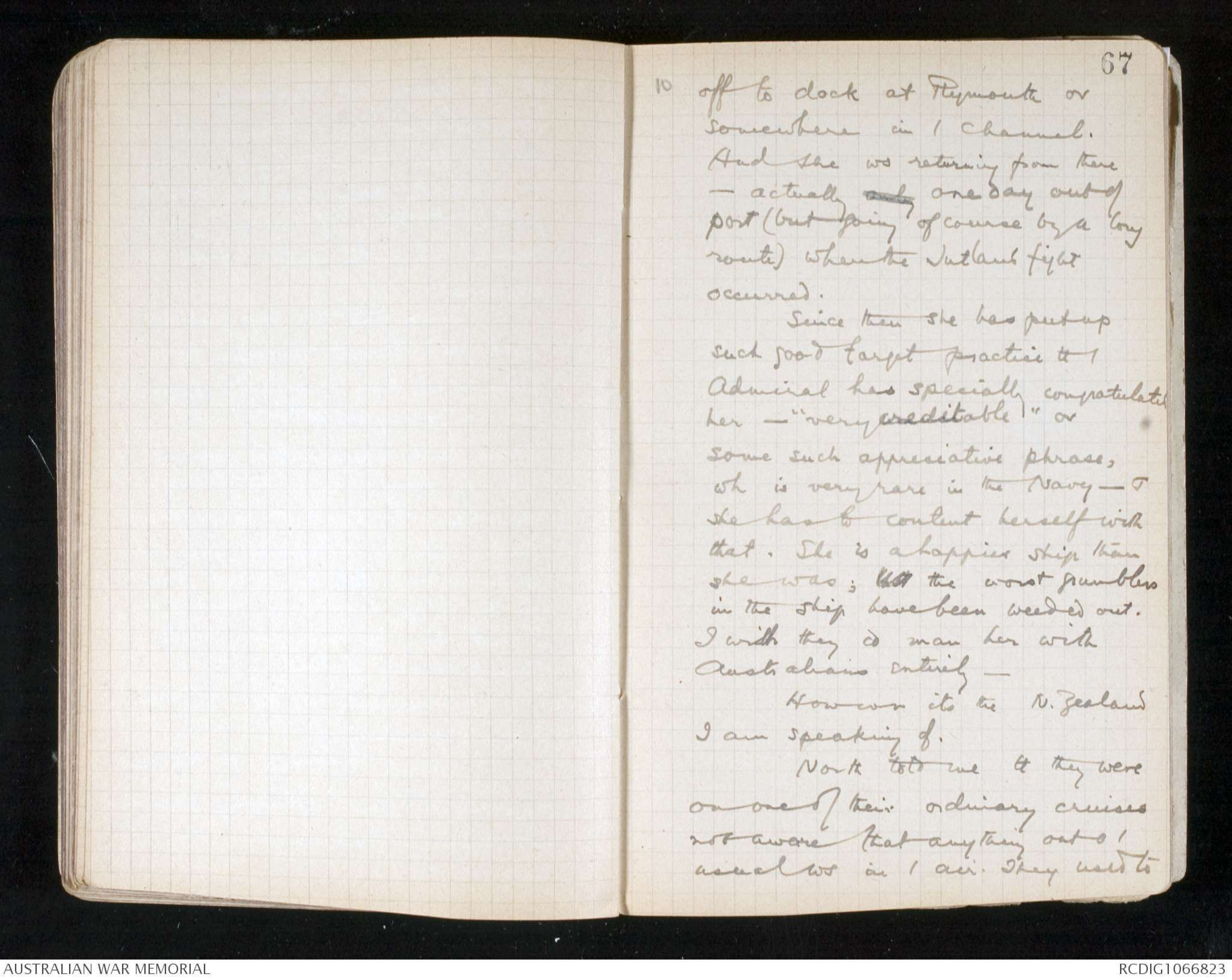
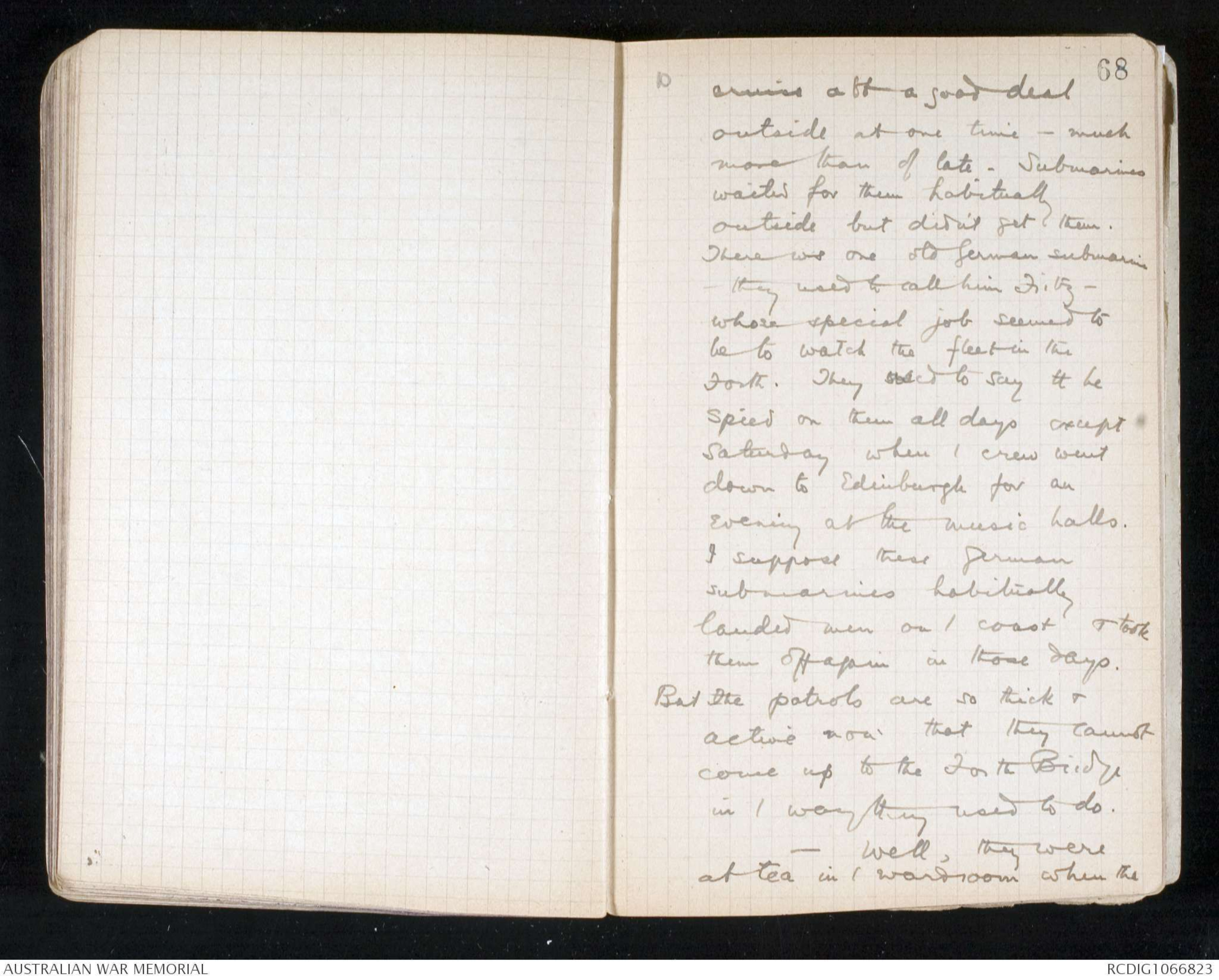
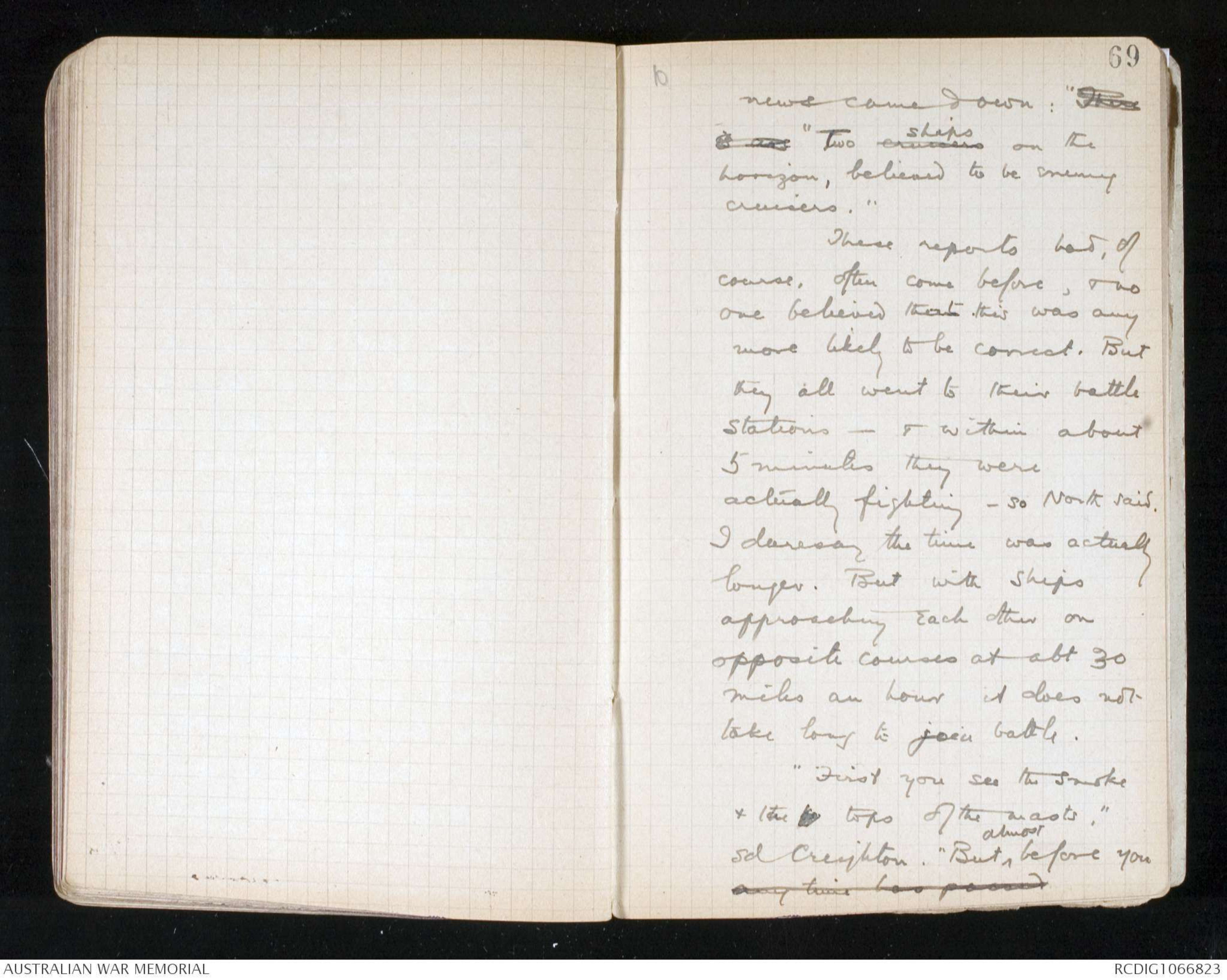
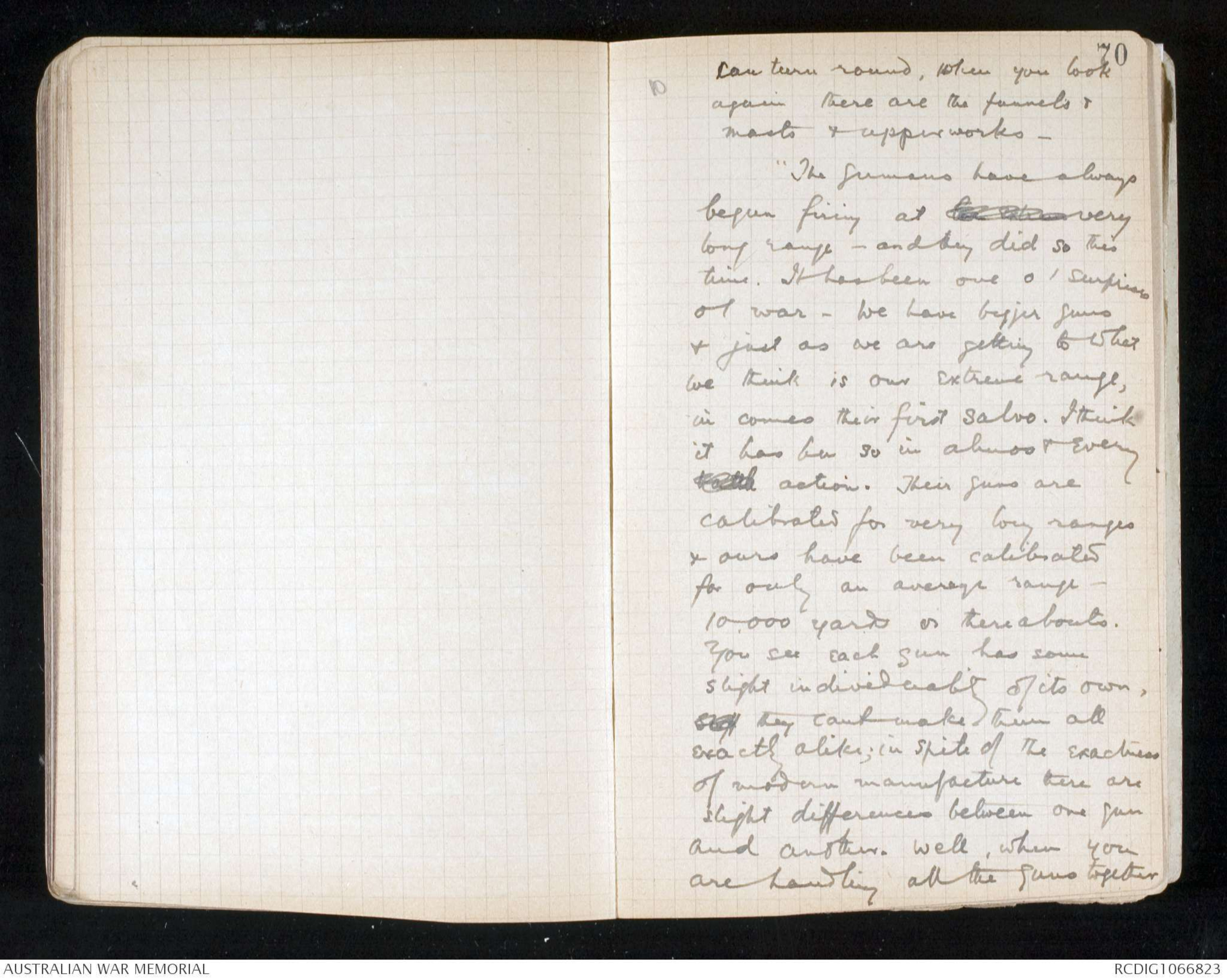
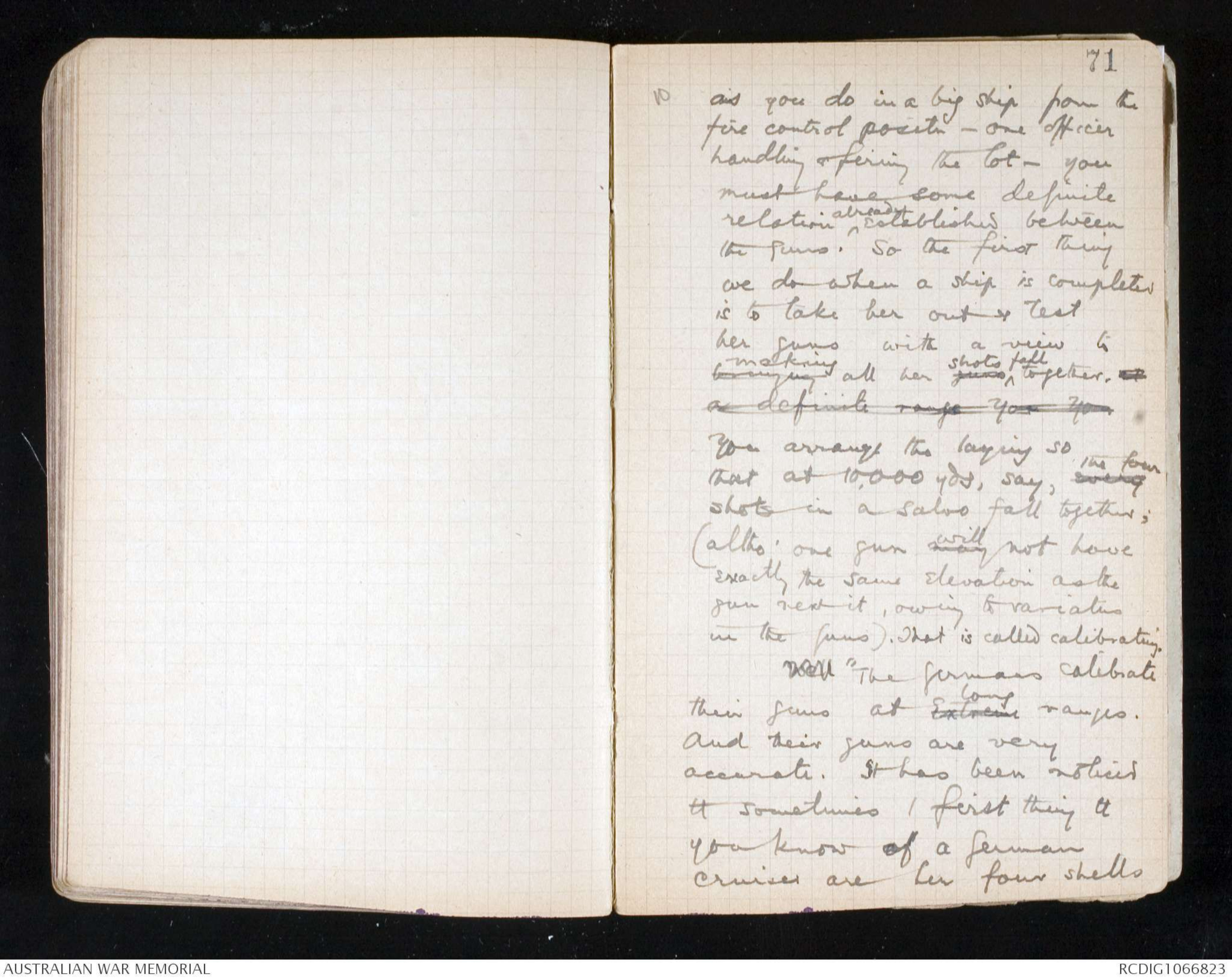
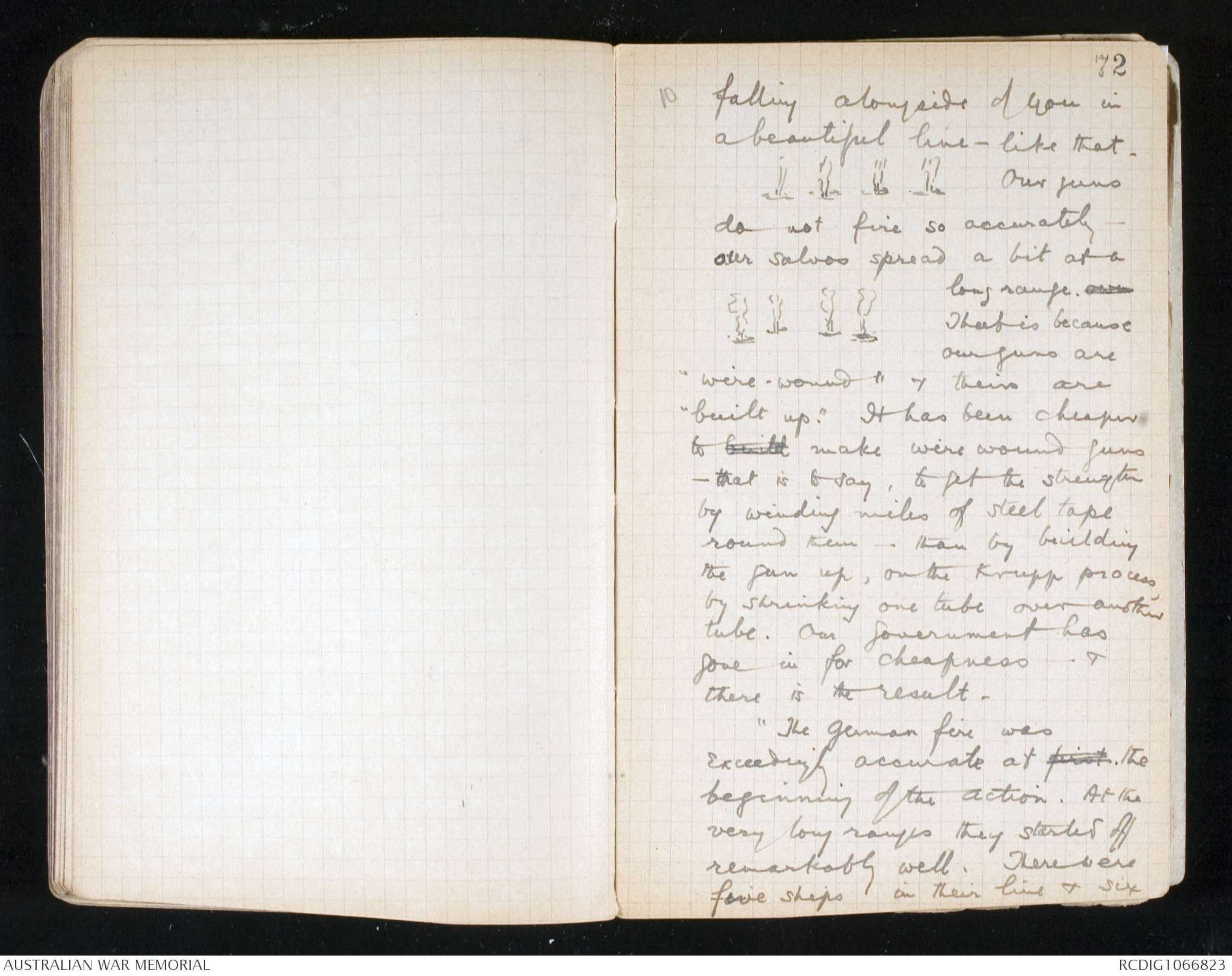
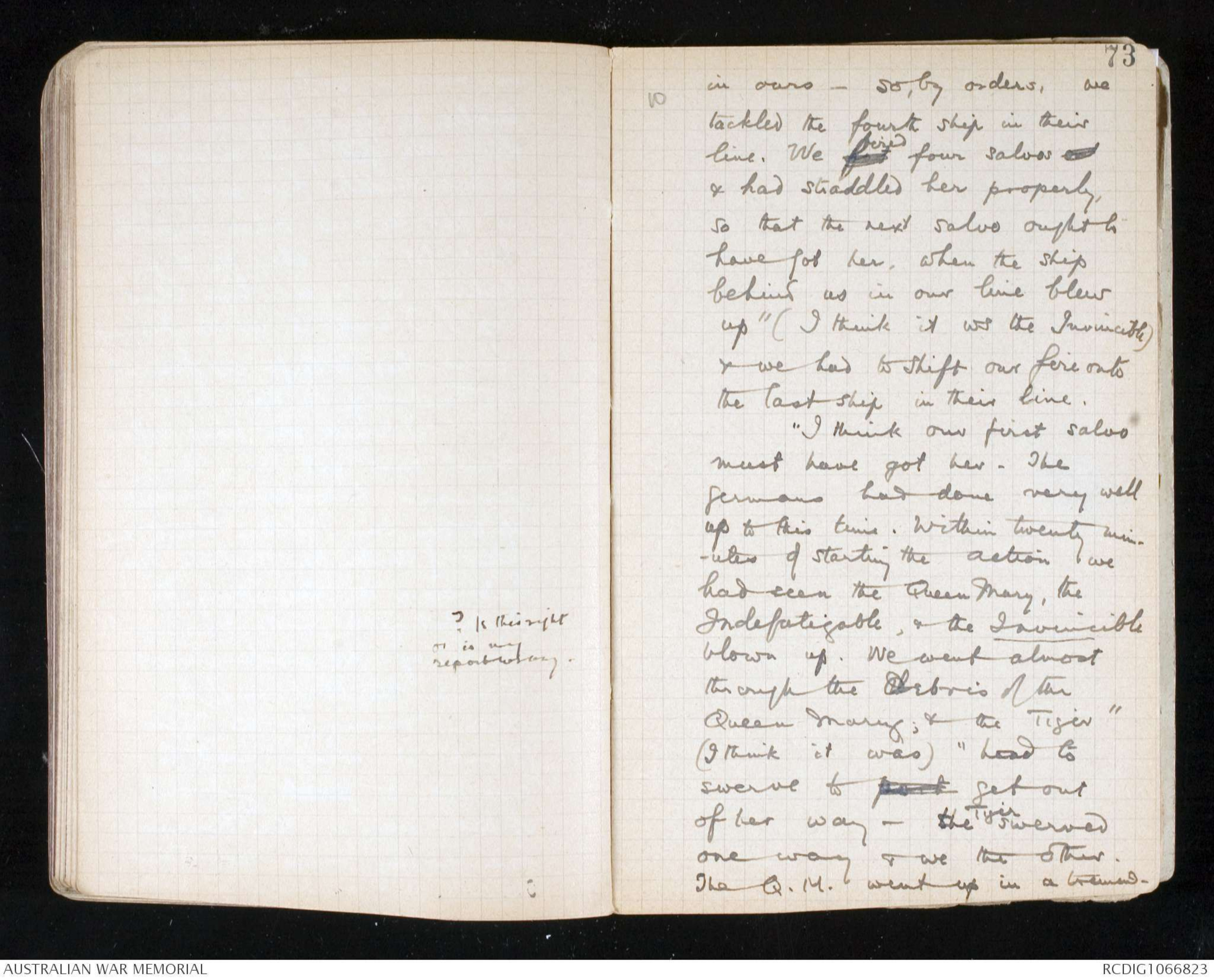
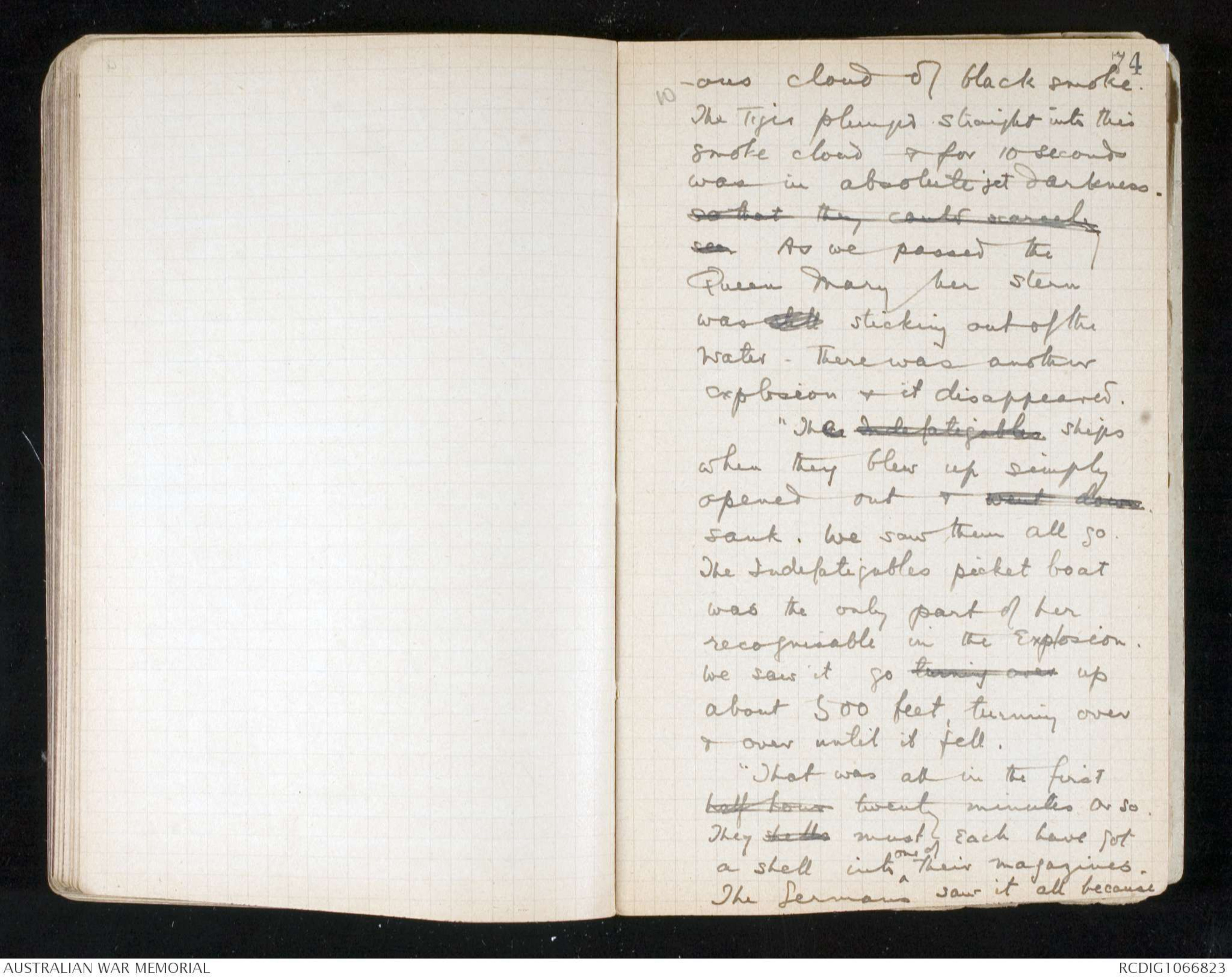
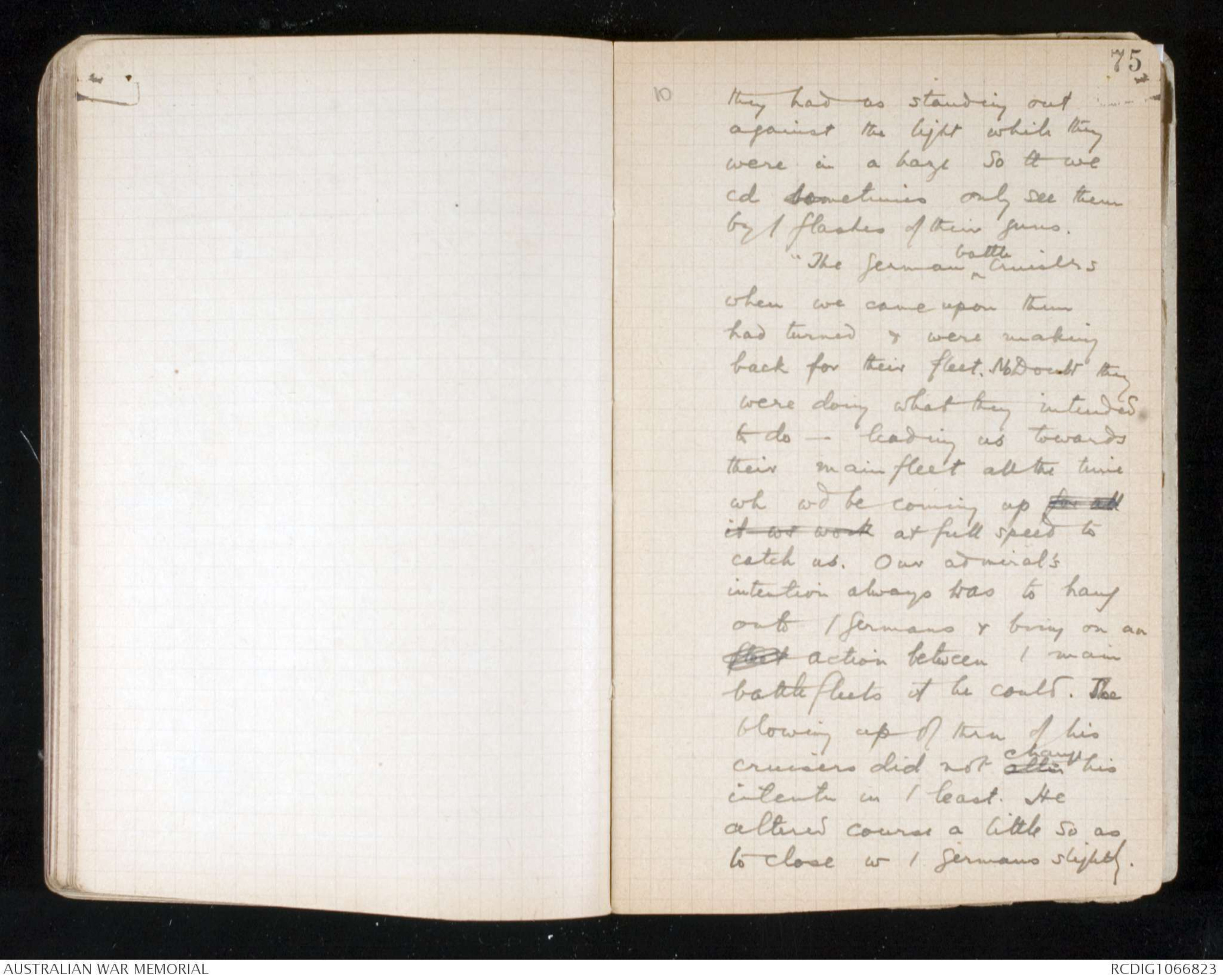
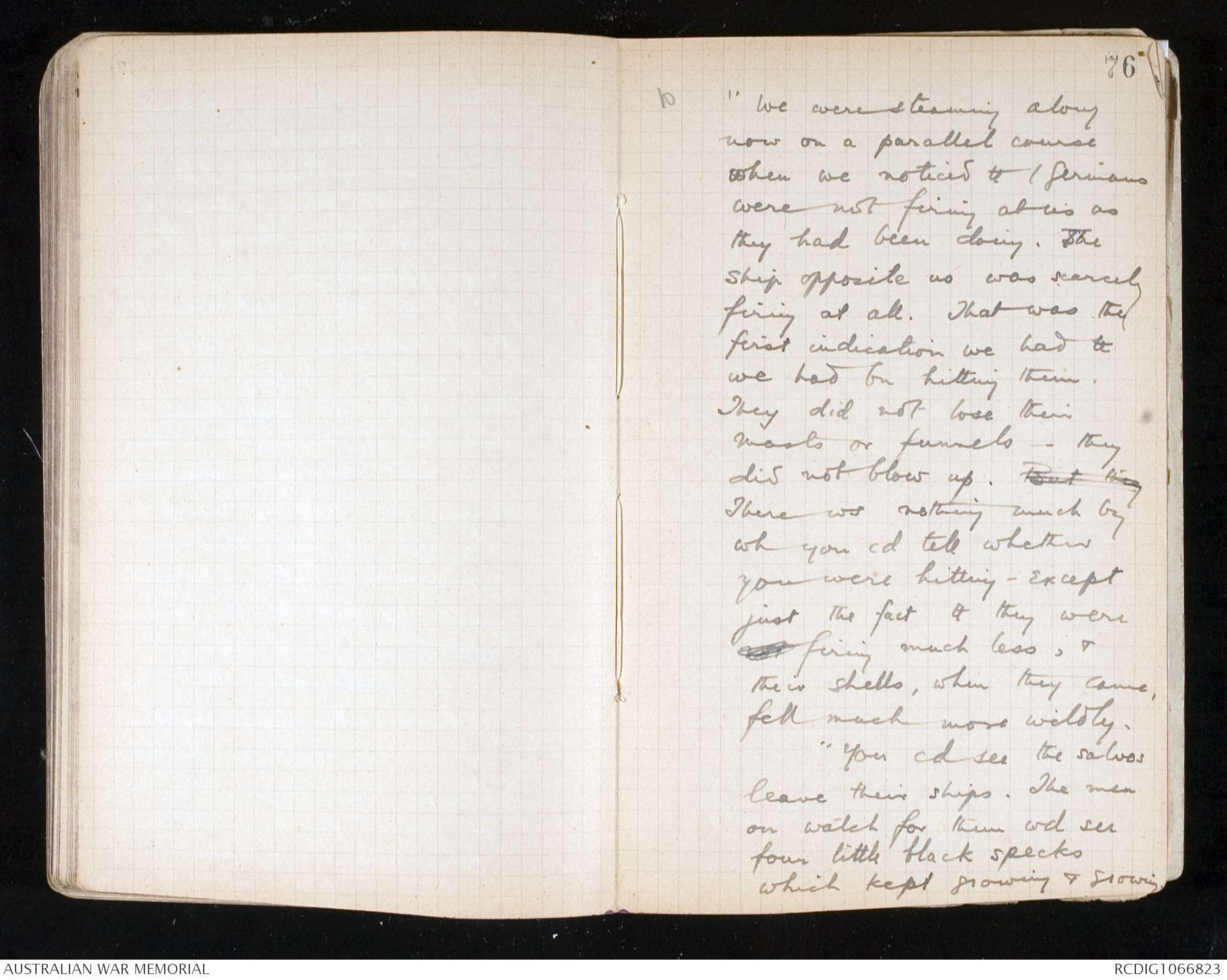
10 67
off to dock at Plymouth or
somewhere in / Channel.
And she ws returning from there
- actually only one day out of
port (but going of course by a long
route) when the Jutland fight
occurred.
Since then she has put up
such good target practise tt /
Admiral has specially congratulated
her - “very creditable” or
some such appreciative phrase,
wh is very rare in the Navy - &
she has to content herself with
that. She is a happier ship than
she was; but the worst grumblers
in the ship have been weeded out.
I wish they cd man her with
Australians entirely -
However its the N. Zealand
I am speaking of.
North told me tt they were
on one of their ordinary cruises
not aware that anything out o /
usual ws in / air. They used to
10 68
cruise abt a good deal
outside at one time - much
more than of late - Submarines
waited for them habitually
outside but didn't get them.
There ws one old German submarine
- they used to call him Fritz -
whose special job seemed to
be to watch the fleet in the
Forth. They used to say tt he
spied on them all days except
Saturday when / crew went
down to Edinburgh for an
evening at the music halls.
I suppose these German
submarines habitually
landed men on / coast & took
them off again in those days.
But the patrols are so thick &
active now that they cannot
come up to the Forth Bridge
in / way they used to do.
- Well, they were
at tea in / wardroom when the
10 69
news came down: "Thereit was " Two cruisers ships on the
horizon, believed to be enemy
cruisers."
These reports had, of
course, often come before, & no
one believed that this was any
more likely to be correct. But
they all went to their battle
stations - & within about
5 minutes they were
actually fighting - so North said.
I daresay the time was actually
longer. But with ships
approaching each other on
opposite courses at abt 30
miles an hour it does not
take long to join battle.
"First you see the smoke
& the ti tops of the masts,"
sd Creighton. "But ^almost before you
any time has passed
10 70
can turn round, when you look
again there are the funnels &
masts & upperworks -
"The Germans have always
begun firing at the extrem very
long range - and they did so this
time. It has been one o / surprises
of / war - We have bigger guns
& just as we are getting to what
we think is our extreme range,
in comes their first salvo. I think
it has bn so in almost everybattle action. Their guns are
calibrated for very long ranges
& ours have been calibrated
for only an average range -
10,000 yards or thereabouts.
You see each gun has some
slight individuality of its own,staff they cant make them all
exactly alike; in spite of the exactness
of modern manufacture there are
slight differences between one gun
and another. Well, when you
are handling all the guns together
10 71
as you do in a big ship from the
fire control positn - one officer
handling & firing the lot - you
must have some definite
relation ^already established between
the guns. So the first thing
we do when a ship is completed
is to take her out & test
her guns with a view tobringing making all her guns ^shots fall together. at
a definite range you your
You arrange the laying so
that at 10,000 yds, say, every the four
shots in a salvo fall together;
(altho' one gun may will not have
exactly the same elevation as the
gun next it, owing to variatns
in the guns). That is called calibrating.Well "The Germans calibrate
their guns at extreme long ranges.
And their guns are very
accurate. It has been noticed
tt sometimes / first thing tt
you know of a German
cruiser are her four shells
10 72
falling alongside of you in
a beautiful line - like that.
Diagram – see original document
Our guns
do not fire so accurately -
our salvos spread a bit at a
long range. over
Diagram - see original document
That is because
our guns are
"wire-wound" & theirs are
"built up." It has been cheaper
to build make wire wound guns
- that is to say, to get the strength
by winding miles of steel tape
round them - than by building
the gun up, on the Krupp process,
by shrinking one tube over another
tube. Our government has
gone in for cheapness - &
there is the result.
"The German fire was
exceedingly accurate at first. the
beginning of the action. At the
very long ranges they started off
remarkably well. There were
five ships in their line & six
? Is this right
or is my
report wrong.
10 73
in ours - so, by orders, we
tackled the fourth ship in their
line. We first fired four salvos on
& had straddled her properly,
so that the next salvo ought to
have got her, when the ship
behind us in our line blew
up" (I think it was the Invincible)
& we had to shift our fire onto
the last ship in their line.
"I think our first salvo
must have got her. The
Germans had done very well
up to this time. Within twenty minutes
of starting the action we
had seen the Queen Mary, the
Indefatigable, & the Invincible
blown up. We went almost
through the debris of the
Queen Mary; & the Tiger"
(I think it was) "had to
swerve to port get out
of her way - the Tiger swerved
one way & we the other.
The Q.M. went up in a tremendous
10 74
cloud of black smoke.
The Tiger plunged straight into this
smoke cloud & for 10 seconds
was in absolute jet darkness.so that they could scarcely
see. As we passed the
Queen Mary her stern
was still sticking out of the
water. There was another
explosion & it disappeared.
" The Indefatigable ships
when they blew up simply
opened out & went down.
sank. We saw them all go.
The Indefatigables picket boat
was the only part of her
recognisable in the explosion.
We saw it go turning over up
about 500 feet, turning over
& over until it fell.
"That was all in the first half hour twenty minutes or so.
They shells must each have got
a shell into ^one of their magazines.
The Germans saw it all because
10 75
they had us standing out
against the light while they
were in a haze so tt we
cd sometimes only see them
by / flashes of their guns.
"The German ^battle cruisers
when we came upon them
had turned & were making
back for their fleet. No Doubt they
were doing what they intended
to do - leading us towards
their main fleet all the time
wh wd be coming up for all
it ws worth at full speed to
catch us. Our admiral's
intention always was to hang
onto / Germans & bring on anfleet action between / main
battle fleets if he could. The
blowing up of three of his
cruisers did not alter change his
intention in / least. He
altered course a little so as
to close w / Germans slightly.
10 76
"We were steaming along
now on a parallel course
when we noticed tt / Germans
were not firing at us as
they had been doing. The
ship opposite us was scarcely
firing at all. That was the
first indication we had tt
we had bn hitting them.
They did not lose their
masts or funnels - they
did not blow up. But they
There was nothing much by
wh you cd tell whether
you were hitting - except
just the fact tt they werenot firing much less, &
their shells, when they came,
fell much more wildly.
"You cd see the salvos
leave their ships. The men
on watch for them wd see
four little black specks
which kept growing & growing.
 Marisa Bortolotto
Marisa BortolottoThis transcription item is now locked to you for editing. To release the lock either Save your changes or Cancel.
This lock will be automatically released after 60 minutes of inactivity.